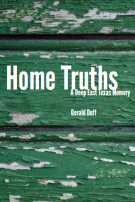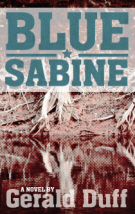|
News
|
|
Friday, 03 August 2012 00:00 |
|
Home Truths: A Deep East Texas Memory Reviewed on Chapter16
 Home Truths: A Deep East Texas Memory was reviewed by Ralph Bowden on August 2, 2012, on Chapter16. Mr. Bowden writes: Home Truths: A Deep East Texas Memory was reviewed by Ralph Bowden on August 2, 2012, on Chapter16. Mr. Bowden writes:
The Impoverishment of Truth
Gerald Duff's memoir explains the nourishment and necessity of lies
Gerald Duff grew up in East Texas, in both the Gulf Coast petrochemical strip and the logged-out piney woods north of there. As he describes the area, it was hardly a hotbed of literary stimulation in the years during and after World War II. Nor was Duff's family exceptional or especially nurturing of his talents. But wherever his gifts for reading and writing came from, they were clear to Duff from an early age; he knew what he was suited for. Except for the two years he spent struggling in an electrical-engineering curriculum, he pursued literature at every opportunity through college, graduate work at prestigious schools, and faculty appointments, including stints at Vanderbilt University in Nashville and Rhodes College in Memphis. His memoir, Home Truths: A Deep East Texas Memory, takes him from his unlikely origins through a career as both an academic and a writer of poetry, short stories, and novels.
This is a likeable story, full of ordinary people in all their variety: relatives, most of them born, unlike Duff himself, with no genetic advantages; unsuitable girlfriends; a schizophrenic first wife; a second too driven to be a wife; a third and current wife who suits the role in every way; two successful children; and lots of colleagues, professors, and other academics, with various bees in their bonnets. Duff reveals how he borrowed from their lives and used many of their traits in his fiction.
Duff's description of his six years at Vanderbilt focuses on its tensions, traditions, and prejudices, sparing no one—neither the imported Ivy League chairman who hired him nor the older members of the department who resented the new chairman and everyone he hired. "I did not belong at Vanderbilt," Duff finally realized. Too low-born to make the expected social grade, he did nothing to improve his standing, drifting "into friendship with the closet homosexuals in the department and the one Jew." Perhaps unsurprisingly, Duff's time at Vanderbilt ended in disaster: the loss of his job, his marriage, and his children and all of it topped off by bankruptcy.
Eight years at prestigious Kenyon College in Ohio were a great improvement: "The English Department was the largest and best at the college, attracting the best students who, for the most part, read what they were assigned, wrote well, and considered themselves to be where they belonged," he writes. During these years, he managed to reclaim his children, but Duff's second wife insisted they move to a big city, where she could pursue her own ambitions. Soon after he landed a deanship at Rhodes (then called Southwestern at Memphis) the marriage failed anyway. As a dean, he soon learned the value of dissembling: "The lie is the coin of the realm in higher education management." His new position allowed plenty of time to write, however, and Memphis provided much grist for the writer's mill.
Throughout the book, Duff develops a theme of creative and spontaneous lying. Manipulating the truth saved him from many a childhood switching, maintained his image among his peers, allowing him to succeed as a dean. "Sometimes a lie is the best friend you can have," he writes. "I spent a lifetime depending on what not telling the truth will do to get me by."
To read the review online, click here. |
|
|
News
|
|
Sunday, 08 July 2012 09:10 |
|
Dirty Rice: A Season in the Evangeline League Reviewed on Tangilena.com
 Dirty Rice: A Season in the Evangeline League was reviewed by Greg Guirard, noted nature photographer and author, on Tangilena.com, July 6, 2012. The review, in its entirety, is reprinted below. Dirty Rice: A Season in the Evangeline League was reviewed by Greg Guirard, noted nature photographer and author, on Tangilena.com, July 6, 2012. The review, in its entirety, is reprinted below.
Check out Dirty Rice – A Season in the Evangeline League by Texas novelist Gerald Duff
By Greg Guirard
You want to read a really good book? A book that will take you back to the days before computers, even before television? Back to a time when every town in South Louisiana, like every town in America, had a baseball team, and when baseball was one of the relatively few forms of public entertainment we had?
Then get yourself a copy of "Dirty Rice – A Season in the Evangeline League" by Texas novelist Gerald Duff, published by UL Lafayette.
Whether the title of this book is a reference to a dish commonly prepared by Cajuns or to a bunch of small-town baseball players (the Rayne Rice Birds, in this case) trying to throw the championship series, the story rings true to life as it was played in those days.
After reading "Dirty Rice" I was ready to believe that Gemar Batiste, the Native American star pitcher from East Texas, really existed, that he played for the Rice Birds in 1935, and that he single-handedly tried to thwart the plans of certain real-life individuals to make a killing by buying off several of Gemar's teammates. In fact, I would be disappointed to learn that it never happened.
I'm also ready to believe that the author himself played in the Evangeline League, so accurate and authentic is his stance and his delivery. Born in 1937, I lived through the twilight of small-town baseball, and I clearly remember watching as the Catahoula Dirt Movers beat every other team in their league repeatedly, beat every opponent thrown against them with the sad exception of early television, the force that took it all away from us forever.
There is nostalgia of the best sort in this book, as well as humor, love, sadness and a generous serving of Native American philosophy. I'm not crazy about baseball, but I found myself reading "Dirty Rice" slowly, sometimes limiting myself to one league game per night, all the way through the championship series, so as not to finish too quickly. It is a time worth reliving, in spite of the Great Depression and the coming world war, and "Dirty Rice" is a story worth reading, at least once.
You can get a copy at area book stores or directly from the UL Press – www.ulpress.org.
Greg Guirard is a noted nature photographer and author.
To read the review online, click here. |
|
News
|
|
Tuesday, 03 July 2012 14:02 |
|
Blue Sabine Reviewed in the Southwestern Historical Quarterly
 Calling Gerald Duff "a major literary talent," Steven L. Davis reviews Blue Sabine in the July 2012 issue of the Southwestern Historical Quarterly (Vol. 116, No. 1, pp. 106-107). Subscriptions to the Southwestern Historial Quarterly are a benefit of membership in the Texas State Historical Association (TSHA). To learn more about membership, click here. The following is an excerpt of the reveiw. Calling Gerald Duff "a major literary talent," Steven L. Davis reviews Blue Sabine in the July 2012 issue of the Southwestern Historical Quarterly (Vol. 116, No. 1, pp. 106-107). Subscriptions to the Southwestern Historial Quarterly are a benefit of membership in the Texas State Historical Association (TSHA). To learn more about membership, click here. The following is an excerpt of the reveiw.
In this beautifully written, wondrously told novel by Gerald Duff, one family's personal history merges with the larger currents of Texan and American history, creating a twisting, turning narrative that is as aesthetically satisfying as it is historically resonant.
Blue Sabine follows several generations of the Holt family from their arrival to the Sabine borderlands in 1867 until the present day. The story is told by a succession of voices, most often the women of the Holt clan. The novel's structure presents the "testimonies" of these family members at six specific points in time: 1867, 1912, 1941, 1968, 1990, 2003. The ultimate effect is to illuminate the social history of this corner of Texas, from a time when scattered remnants of the Native American population still wandered the forests until today, when you can "feel that bite" of "petroleum and chemicals in the air" (290).
In 1912, we get a clear look at the complex, nuanced nature of race relations through the eyes of one of the Holt sisters, Maude, who is on her way to assist an African American woman, Joleen, whose husband is being hunted by a lynch mob. Maude recalls how she met Joleen as a child at a secret spring, where the two shared the water, a simple act of friendship that takes on symbolic importance in a land ruled by Jim Crow. When Maude told her mother how she loved Joleen, she was met with a sharp rebuke: "You do not love Joleen. You cannot love a colored girl from the quarters. And you may never say that again, you must never say that again, to me or to anyone else, particularly" (103). Yet the memory of that early bond persists, and now Maude is determined to rescue Joleen's husband, though she is armed with nothing more than a horse-drawn wagon loaded down with freshly cut flowers. Duff handles the scene with incredible delicacy and suspense, signifying him as a major literary talent.
By 1941, Maude is on her deathbed, but the stories continue to weave the family together as her granddaughter is on the scene. We hear about the death of Maude's son, Richard, who survived the Great War in Europe only to die working for a logging company in the Piney Woods. And then there's a brother, Lewis, who at news of the oil boom at Sour Lake "left home so fast he had to carry his goods in a cut-down cotton sack, shouting from the road at me that the next time I saw my brother he'd be riding in a shiny automobile belonging to nobody but him" (149). Lewis did get his new car, but he also became blinded as a result of an unfortunate encounter at a whorehouse in Beaumont. As this section ends, the family hears the words "Pearl Harbor" spoken on their radio.
Duff's novel makes clear that kinship ties run deep in the Sabine bottomlands, and the power of story is paramount. It is in the telling of tales, the ability to use the right words, that the people of the Holt clan—and perhaps all Texans —secure their identity, along with their relationships to each other. As Maude remarks about her sister's attempt to tell a particular story, "she is fitting all that into a pattern to serve her purpose, but I will not correct or contradict what she needs to believe is true in her story. She must have that as she wants it, and what business of it is mine to deny my sister the shaping of the world which will feed her the nourishment she craves? I grant her that" (211).
Copyright © 2012 The Texas State Historical Association.
|
|
|
|
|
<< Start < Prev 11 12 13 14 15 16 17 18 19 20 Next > End >>
|
|
Page 17 of 28 |


